The Science of Distilling
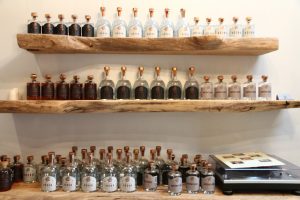 I have always been fascinated by how art and science come together to form the beauty that is craft spirits, yet I never really thought of it as a career.
I have always been fascinated by how art and science come together to form the beauty that is craft spirits, yet I never really thought of it as a career.
How can someone be so lucky that they get to make craft spirits for a living? I always thought I needed to get a ‘practical’ job in an office to make a living, however, being able to explore the craft spirit industry has further solidified my passion for distillation.
After graduating from UVic I plan to continue my education in the craft spirits industry by taking a graduate distilling course. With this new-found career goal, I decided to further educate myself on how the liquor industry incorporates science into the distillation process by interviewing a few distillers from different educational backgrounds.
I wanted to learn whether or not a science degree was absolutely necessary for distillation and what other skills distillers found helpful or wish they had before starting up in this industry. This research has opened so many doors for me and has allowed me to meet so many inspiring people throughout the process. I would just like to thank those of you who have helped me with this research and especially the distillers that took the time to be interviewed. I have learned so much and truly enjoyed every aspect of this experience.
The craft distilling industry really started in 2013 after the BC government changed its liquor laws to open up the industry to small scale distilleries. These changes gave entrepreneurs from all different backgrounds the opportunity to start their own distilleries.
Distilleries in BC are encouraged to use 100% BC grown raw materials to produce their product. This has led to distillers finding inspiration in the nature that surrounds us. With this has come many different flavour profiles and has expanded the way we make spirits.
There is constant innovation in this industry as our distillers push the boundaries of what is possible with spirits; from building your own still, using honey as a base instead of grain, or using wing kelp and cherry blossoms in the distillation process. There is always something new happening in BC.
(Be sure to read my second post, The Science Behind Brewing the Best Beer)
Ampersand Distillery
Ampersand Distillery opened in 2014 on the Schacht family farm in the Cowichan Valley.
This distillery is incredibly unique in the sense that the stills they use, Dot and Dash, were built on site using Stephen and Jeremy’s engineering degrees.
These stills allow for their spirit to be incredibly consistent and produce 96.5% base spirit which they then turn into their award-winning gin and vodka by diluting it with the natural spring water on their property.
![]() Their gin has been voted BC’s best gin three times. The gin starts with a wheat base and then eight organic, wild harvested botanicals are added to create this bright classic gin that goes well in every cocktail or can be sipped at alone on the rocks.
Their gin has been voted BC’s best gin three times. The gin starts with a wheat base and then eight organic, wild harvested botanicals are added to create this bright classic gin that goes well in every cocktail or can be sipped at alone on the rocks.
Unfortunately, I was unable to make the trip up to their distillery due to the freak snowstorm we experienced but Jessica and Jeremy were kind enough to complete the interview questions that I e-mailed to them.
Q&A with Jessica Schacht
What degree did you graduate UVic with?
I have a Bachelor of Fine Arts from the Department of Theatre at UVic. My specialization was Production & Management.
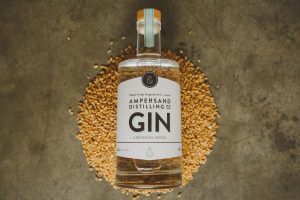
How did you end up distilling?
After graduating, Jeremy and I found ourselves working outside of our respective fields. Jeremy’s background in Chemical Engineering had developed an interest in distillation. We decided to move in with his parents and try to start a distillery there.
Do you think a science degree would have been helpful in building your career in this field?
I think the diversity of knowledge that our team brings together is what makes us successful. My theatre degree was great preparation for starting and running a business thanks to my organizational and communication skills. I also bring my creativity to the table, writing all the copy for the business and liaising with our designer.
What inspired you to move from the theatre into distilling?
It was really a matter of opportunity – I had great faith in Jeremy’s knowledge and skills. His parents are also entrepreneurs, so it seemed like a natural progression. I was able to take theatre contracts and nurture my career alongside the development of the distillery.
In your experience what role does science play in distillation?
Our distillery is founded on the idea of bringing things together – we strive to excel in both the art & science of distillation. Our technical knowledge allows us to create pure clean spirits that taste amazing. This is largely due to the fact that Jeremy and his father Stephen designed and built our stills. Our 500L packed column still is unlike any other in the world and allows us to distill up to 96.5%.
What other credentials or skill sets do you think would have been the most helpful?
Microbiology and fermentation are really helpful areas to learn about and apply whether you are working in a brewery or distillery.
What advice would you give students interested in pursuing a job within the industry?
Visit distilleries, taste spirits, get a feel for what you like. Having a strong point of view when it comes to building a business and a line of products is key. The craft distilling industry is also really generous – we always try to do our part to help up and coming distillers.
Why is BC such an exciting place to work?
BC is at the forefront of the craft spirits movement in Canada. There is an abundance of raw agricultural goods to make alcohol from (we use organic BC soft white winter wheat) and a beautiful landscape to be inspired by.
Is there anything we are doing differently in BC?
The legislation that created the craft distillery agreement in BC was huge. Because we use BC raw agricultural goods to make our own alcohol from scratch means we have the right to direct distribute. We sell directly to private liquor stores and restaurants, as well as at farmers’ markets. It’s encouraged relationships with farmers and has been great for both the distilling and agricultural economies.
How did you come up with the signature Ampersand gin?
Jeremy and I developed the recipe to be a take on a classic London Dry Gin. We love classic cocktails and wanted something that would make as good a Negroni as it did a Martini. We approached the recipe trying to create a complex flavour with as few botanicals as possible. Our recipe features bold juniper, coriander, and fresh lemon peel on the nose, followed by spice from grains of paradise and cardamom, and finishes with earthier botanicals like angelica and orris root. Overall, it’s a bright clean tasting gin that’s extremely versatile.
Q&A with Jeremy Schacht
Where did you attend university and what was your degree in?
UBC Bachelor of Applied Science (Chemical Engineering)
How did you transition from traditional sciences to an applied science field such as distilling?
I was already doing applied science within the Engineering department – my specialty was chemical process. Typically, this is used for the creation of petroleum products, but I applied my knowledge to distilling alcohol instead.
Have you always been interested in distilling?
I had a real passion for chemistry when I was younger. The creation of something from something entirely different and distillation being the purification of those elements… I find that quite amazing.
What made you transition from chemical engineering into distilling?
Distilling alcohol was more of a lateral move. Chemical process involves a lot of distillation, I just applied it to a different field
How has your engineering degree helped you in this industry?
It allowed me to have the knowledge to design and build the stills we use. I also have a deep understanding of the different fermentation components which allows me to create better-tasting alcohol.
What was the process of building your own stills like?
It started with calculations to figure out what each component should be. Then I acquired metal working skills — learned how to weld — and burned through about 10 Angle grinders in the process. If I had to do it again I could do it way faster — there was a lot of decision making.
In your experience what role does science play in distillation and brewing?
A huge one! For the final product, it really does come down to the art & the science. Science alone won’t get you there.
What other credentials or skill sets do you think would have been the most helpful?
Microbiology – a lot comes down to fermentation.
Sheringham Distillery
Sheringham Distillery was founded in 2015 by husband and wife team Jason and Alayne MacIsaac. Sheringham believes in the importance of sustainable harvesting and sources all raw materials from BC and Vancouver Island. By using these principles Jason has forged strong ties with local farmers and has reduced their carbon footprint.
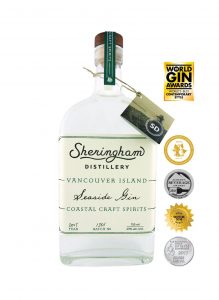 In this year’s World Gin Awards held in London, Sheringham won the gold award for best contemporary gin in the world with their flagship Seaside Gin.
In this year’s World Gin Awards held in London, Sheringham won the gold award for best contemporary gin in the world with their flagship Seaside Gin.
Seaside gin is incredibly unique as it uses sustainably sourced Wing Kelp from the Juan de Fuca Strait. This creates a gin that is reminiscent of the island where it is made.
Jason’s newest addition to their line of fantastic spirits is the Kazuki gin, which utilizes Canada’s only locally grown tea leaves and cherry blossoms from the Westholme Tea Farm in the Cowichan Valley.
This gin offers many distinct flavours that play off the tongue magnificently. The green tea brings a herbal earthiness to the light floral notes of the cherry blossoms, all while being rounded out by the crisp citrus notes of grapefruit and yuzu.
Jason combines his knowledge of flavours and combines them with local ingredients to make distinct and one of a kind spirits that showcase BC’s botanicals.
Stop by Sheringham’s to go on one of their tours so you can experience the process from grain to bottle and how everything is put together.
Q&A with Jason MacIsaac
It was mentioned you had a background in culinary – are you a chef by trade?
That’s right. I went to Dubrulle French culinary school in Vancouver and graduated in ’93. After that I was a professional chef for 23 years. I was a private chef for around 12 years at the end of my career which was great.
How did you transition from culinary into distilling?
I dabbled with distillation over the years. It was always a passion of mine. I always had a fantasy of having a distillery, so, it just kind of turned from a hobby into a career.
What was the inspiration or the push to actually get you to start up a distillery?
I was catering a private party, which was a meeting where they were discussing the change in policy and creating craft plans in 2013. They opened up the industry to craft distilleries. They were discussing it and I realized that it would be possible to do it on a smaller scale because of the change in the provincial law. After I left there I just hit the ground running and kind of haven’t stopped ever since.
In your experience, what role does science play in the distillation process?
It’s everything to do with the chemistry of mashing fermentation, and of course the distillation is all science. It’s all science data but a lot of math as well.
Do you think a science degree would have helped you kind of get off the ground or do you feel like it’s more the basics of science?
A science degree would have helped that for sure. Learning fundamentals of distillation and microbiology as far as fermentation goes would help for sure. Absolutely.
Are there any other credentials or skill sets that you think would have helped?
As far as a business goes, business skills would have been helpful. My wife’s background is sales marketing and business. My experience is the production on the culinary side of things. Both of those are equally as important. Alayne and I work really well together, and our individual skill sets make this business work when they are combined together.
Is there any advice that you would give to students interested in pursuing a job in the industry?
Visit as many distilleries as you can, make contact with distillers. Make those connections and see what people are doing, how they’re set up, how they’re operating, and what they’re using for equipment. Just get the whole feel of the place. Every distillery or visit will be completely different. Everyone will be doing something different. Some people are open to discussing these things, some people are not. That’s fine but visiting distilleries and talking to people is very important. If you are going to visit a distillery it’s very important to call ahead or email ahead to see when somebody has time because people that run businesses are very very busy. Know if you do decide that you’re going to be in this industry you have to work very hard long hours and cut through all the blood and sweat and everything else that goes along with it. I mean be prepared for that. Yeah, the fantasy of owning a distillery and the reality of it might be two different things. It involves a lot of hard work.
How has your background as a chef helped with distilling? Has it allowed you to push different boundaries that some distillers aren’t as comfortable with?
I think it has helped me, but I don’t think it’s helped me push boundaries. My palate has been developed over the years and I think that that has helped a bit with the development of different flavours. My wife has been an inspiration as far as coming up with interesting ingredients. She has a lot of great ideas then I try to put them into practical application and make them work. On the production side of things, my culinary background has helped me. I’d say those things have helped quite a bit, just being able to work long hard hours. That kind of work in the trenches teaches you to do whatever it takes to get things done. My culinary background has helped me get to that.
Salt Spring Shine
Salt Spring Shine was founded by Michael and Rie Papp on Salt Spring Island. Their distillery is 100% honey based, which gives each one of their spirits a very distinct and beautiful flavour.
Because their operations are honey-based, the process of fermentation is very different from that of traditional grain or fruit-based fermentation.
Here at Salt Spring Shine, they make a neutral base first which is their moonshine, then they produce their Hive vodka, Sting gin, and Apple Pie Moonshine by adding BC botanicals and fresh apples.
You can find their products at a few private liquor stores on Vancouver Island or find their distillery on Salt Spring Island to truly experience the whole process of honey-based fermentation.
Q&A with Michael Papp
What role does science play in distilling?
It plays, I would say, 50/50. Fifty percent is science but there is a lot of feeling to it too. I never went to school for it. It’s just fermentation, which I think is more feeling than science. You have to have your quantities, but with temperature, you have to feel how it’s going. I am a honey-based distillery, so my fermentation is 7 weeks. There is a big difference between grain or fruit where the process is 3-10 days. With honey, it all depends on temperature and you have to watch it. Honey doesn’t like to ferment, it has natural antibacterial properties, so it just stays as honey. That’s why it takes much longer and is a much slower process.
Do you have to add anything to it so coax it along to ferment?
I do a nutrients schedule. When most people do a nutrients schedule, they can just dump them in right at the beginning of the process and they don’t really have to worry about it. I have to do it over a few days, and aerate it, make sure the PH is perfect, which is a daily process. The last week you can just leave it to do its thing, but before that, it is a much more involved process than your typical wheat or fruit-based spirit.
You mentioned you were in trades as a profession?
Tool and die was my first trade. I did that as a family business, and then I did Le Cordon Blu, so I am a chef also.
How did you transition from trades to distilling?
I used to manage Gary Oaks winery, here on Salt Spring Island. Then in 2013 the BC government changed its licensing and opened up the craft distilling part. Distilling was always something we did as a hobby, but never really thought of as a business because it was never an option. In 2013 I left Gary Oaks and started to build my distillery and pursue the licensing.
Are there any credentials you think would have been helpful?
Any winery, distillery, or brewery kind of uses the same equipment, so when I went from the winery to here I was familiar with everything. The fermentation tanks are pretty consistent, and the pump is the same pump. You know how everything works, everything is familiar, so any kind of experience in the liquor industry would pay off. Sure, there might be differences, like my fermentation process is different, but you are all fermenting, and it’s generally the same thing — you add yeast, control the temperature, it’s just the fine-tuning and the detail.
Any advice for students?
Definitely work for someone before to get yourself familiar with the equipment and the operations, and how you would do things. Once you stop learning that’s it, you’re done, go to the next place, or go out on your own. You just have to figure it all out. You know, before prohibition every farmer had a still in their backyard and made liquor for his tractor. They all did it, it’s not that hard.
Being able to conduct these interviews and to learn more about the craft spirit industry has further inspired me to pursue this passion.
Over the last month, I have learned so much about what to expect and what skills are valuable when it comes to working in a distillery. I cannot wait to take this knowledge and apply it to my future endeavours.
Once again, I would like to thank the distillers that took the time out of their busy schedules to talk to and inspire me. Being able to talk to you and see your workplaces has shown me that it is possible to come from all different backgrounds and to apply different skills to making phenomenal craft spirits.


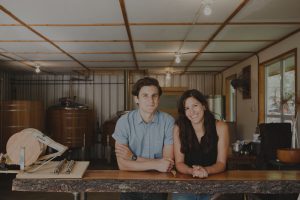


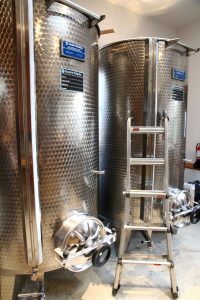


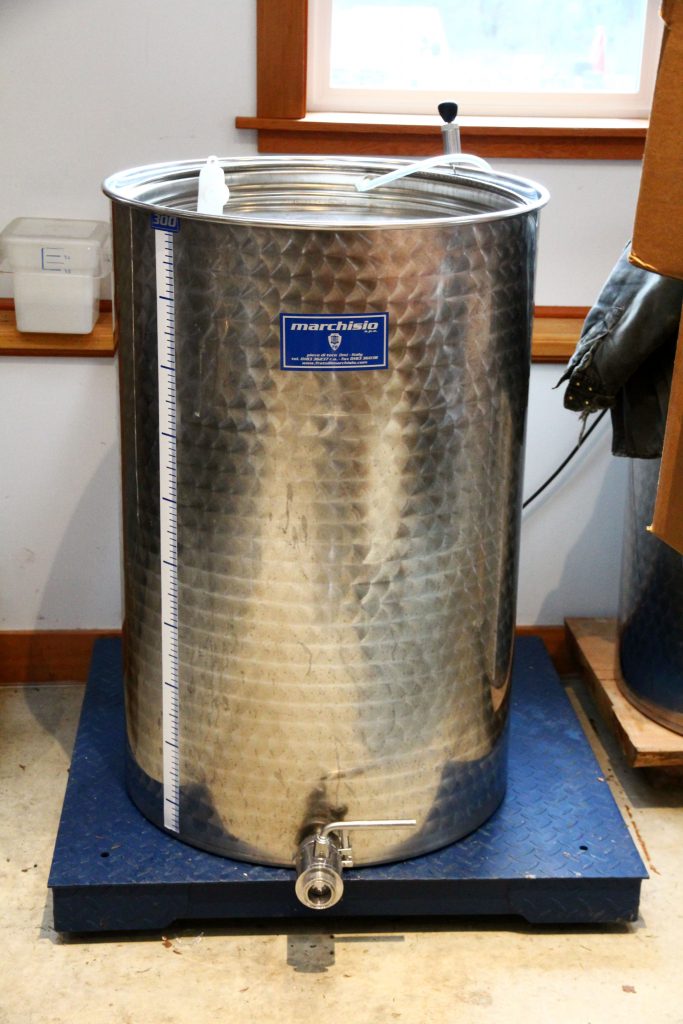






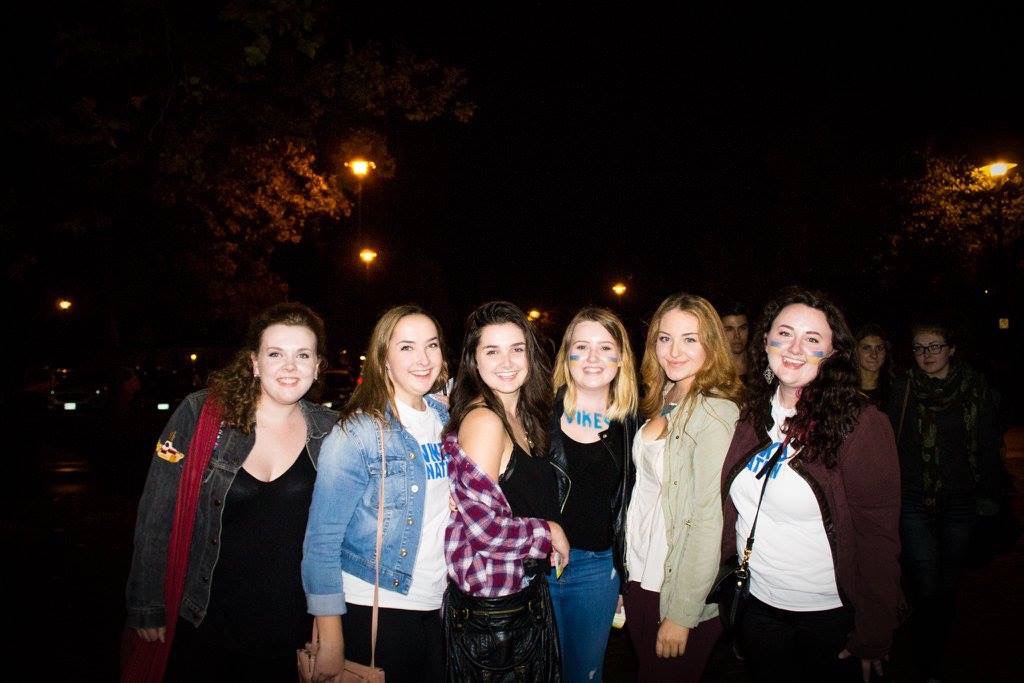
Awesome article Avery. Check out BC Spirits, it lists all the Distilleries in BC, http://www.bcspirits.com
I love looking through the BC spirits website and instagram! It’s one of my favorite pass times, their tasting videos are super fun! Thanks for reading my blog
Hi Avery,
Could I give you a call to find out more information?